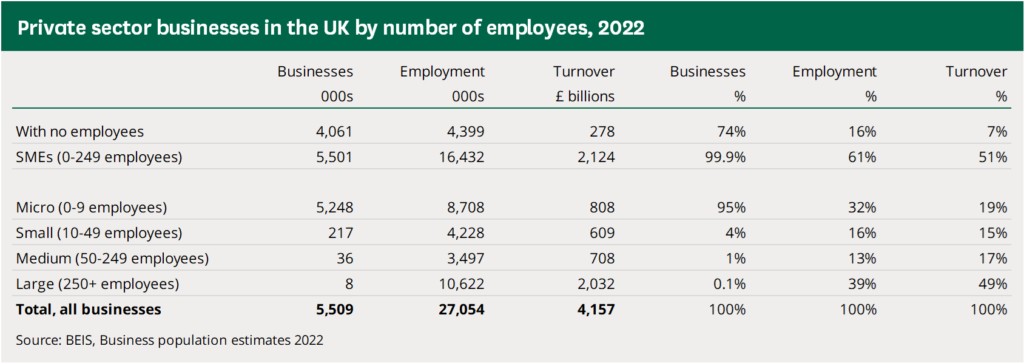Businesses by size
As of the start of 2022, the UK was home to 5.5 million private sector businesses, marking a 1.5% decline compared to 2021. This decrease was less pronounced than the substantial 6.5% dip observed from 2020 to 2021 — the most significant downturn since record-keeping commenced in 2000, primarily propelled by a reduction in very small, non-employer businesses, which represent the largest business category in the UK.
In 2022, 74% of UK businesses did not employ any staff. Moreover, small and medium-sized enterprises (SMEs), defined as businesses employing between 0 and 249 individuals, constituted over 99% of businesses. These SMEs were responsible for 61% of employment and 7% of business turnover in the UK.
Conversely, approximately 8,000 large businesses, those employing 250 or more individuals, existed in January 2022. Despite making up a mere 0.1% of the total business population, these entities supported 39% of employment and almost half of all business turnover.
Business Distribution by Location
In 2022, London was home to 1.0 million businesses, making it the region with the highest business concentration in the UK. When combined with the South East of England, these two regions housed just above a third of all UK businesses.
Sectoral Overview of Businesses
The service industries dominated, making up 76% of businesses and contributing to 80% of employment and 72% of turnover. Although the retail industry was responsible for 35% of business turnover, it represented only 10% of the business population. Manufacturing, on the other hand, made up 4% of businesses and contributed to 9% of employment and 14% of turnover.
Women’s Participation in Business
In 2021, women were at the helm of 19% of SME employers and 20% of SMEs without employees.
As of February 2022, women held 39.1% of FTSE 100 directorships. All FTSE100 boards had female representation, while 36.8% of FTSE250 and 37.6% of FTSE350 directorships were occupied by women.
Minority Ethnic Leadership in Businesses
In 2021, SME employers led by individuals from minority ethnic groups (MEG) comprised 6%, and SMEs without employees under MEG leadership constituted 5%.
As of May 2022, 94 FTSE 100 companies had at least one director from a minority ethnic background, an increase from 74 in November 2020. In December 2021, of the 1,056 board positions in FTSE 100 companies, 155 (15%) were occupied by minority ethnic directors, with women representing 49% (76 individuals) of these directors.
Source: https://commonslibrary.parliament.uk/research-briefings/sn06152/











